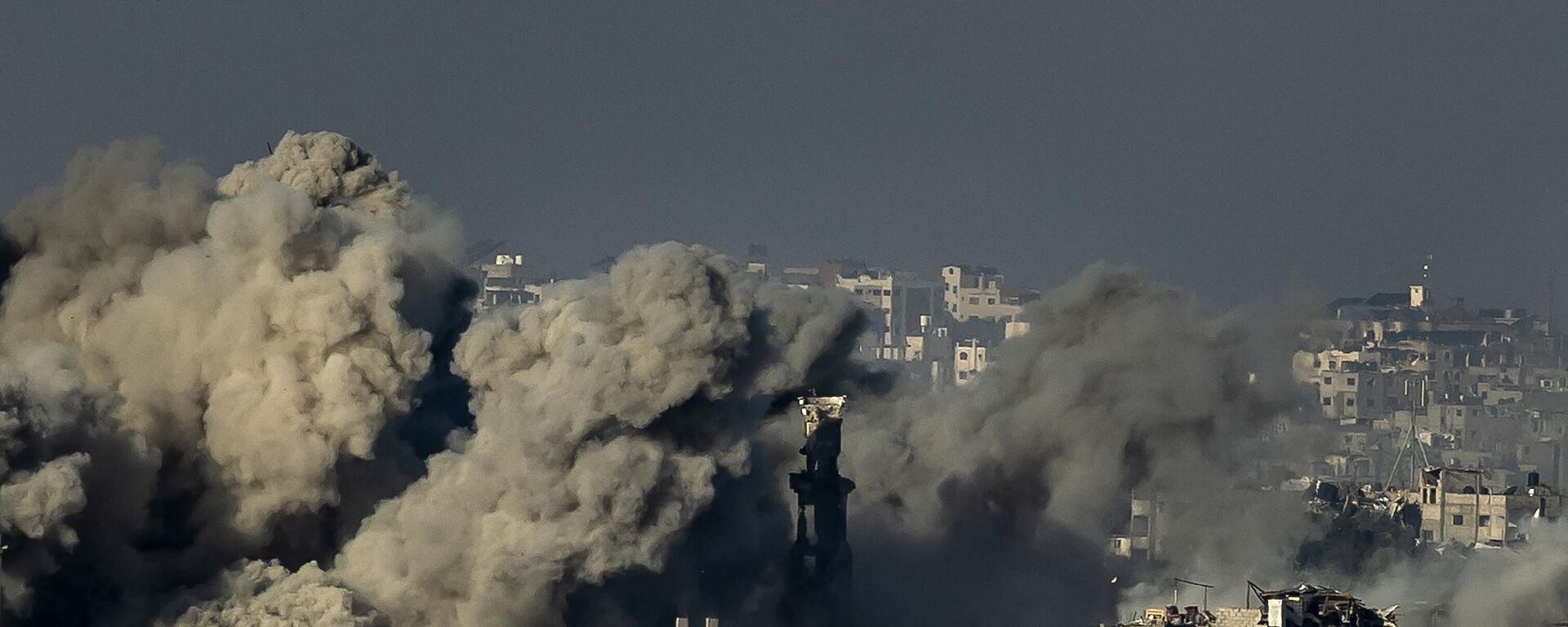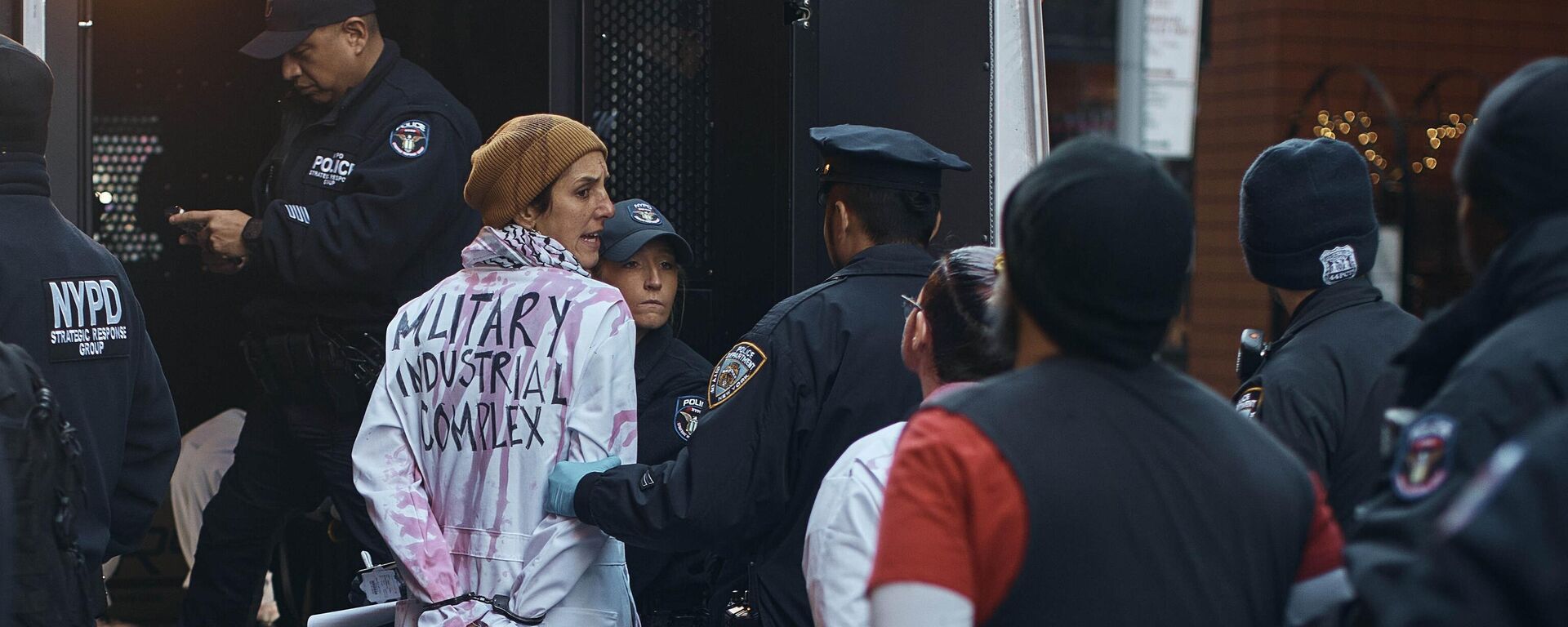https://sputnikglobe.com/20231217/internal-opposition-to-netanyahu-explodes-after-idf-killing-of-israeli-captives-1115632781.html
Internal Opposition to Netanyahu Explodes After IDF Killing of Israeli Captives
Internal Opposition to Netanyahu Explodes After IDF Killing of Israeli Captives
Sputnik International
More than 18,700 Palestinians, mostly civilians, have been killed in Israel’s military campaign in Gaza as the United States has twice vetoed ceasefire resolutions at the United Nations.
2023-12-17T00:54+0000
2023-12-17T00:54+0000
2024-06-24T11:18+0000
world
palestine-israel conflict
israel
israel defense forces (idf)
killings of civilians
benjamin netanyahu
palestine
hamas
tel aviv
palestinians
https://cdn1.img.sputnikglobe.com/img/07e7/0b/19/1115198896_0:122:2340:1438_1920x0_80_0_0_7c1df7b1c09fe959ff1d5ac2565b2dab.jpg
Large demonstrations rocked the Israeli capital of Tel Aviv over the weekend as the country’s military admitted responsibility for the killing of three Israeli captives who were reportedly attempting to surrender.The demonstrations began Friday after news first emerged of the captives’ death. The Israeli civilians, all of them in their 20s, appeared outside of a building in the Shejaiya neighborhood in northern Gaza City, according to an IDF statement released Saturday. The young men held a white flag signifying their surrender and emerged shirtless to demonstrate they weren’t hiding weapons. One reportedly yelled “help” in Hebrew.All three were shot by Israeli service members in violation of international law dictating the rules of military conduct. An IDF spokesperson said the soldiers reacted in response to a feared threat from the group Hamas.Halevi said that he accepted responsibility for the killings and claimed “we will do everything” to prevent similar incidents in the future.A brief ceasefire earlier in December resulted in the exchange of captives held on both sides of the conflict. Hamas brought about 240 Israelis back to Gaza during their surprise October 7 operation in Israel, while Israel holds thousands of Palestinians in prison, including some 2,500 who are detained without charges. Among the captives held by Israel are at least 146 Palestinian minors.Protesters have urged Israeli Prime Minister Benjamin Netanyahu to negotiate a new ceasefire and exchange of captives. US media has reported that the head of Israel’s Mossad intelligence agency was scheduled to meet with the Qatari Prime Minister this weekend to discuss the matter.Meanwhile, family members of citizens held in Gaza have slammed the Israeli Prime Minister’s prosecution of its proclaimed war on Hamas.Israeli society has been torn apart by massive protests for more than a year as controversial Israeli Prime Minister Benjamin Netanyahu enters his 17th year as the Middle Eastern country’s head of state.Previously Israeli opposition took to the streets to protest a legal reform package proposed by Netanyahu that critics said would have gutted the independence of the country’s judiciary. Elements of the sweeping proposal were placed on hold amidst the show of defiance, which saw Israeli military reservists threaten mass resignations from their posts.When a member of Israel’s opposition finally took power for just over a year in 2021, former Prime Minister Neftali Bennet’s governance showed just how far politics in the country had shifted away from the liberal Labour Zionism that characterized previous administrations. Bennett was criticized for a debate performance where he declared, “I've killed lots of Arabs in my life and there's no problem with that.”Recently, controversy erupted after video emerged of a 1986 interview with Netanyahu where he appeared to justify the bombing of hospitals. Israel has been sharply criticized for its handling of their military incursion into Gaza, with United Nations Secretary-General António Guterres saying, “Gaza is becoming a graveyard for children.”About 70% of the more than 18,700 Palestinians killed in the besieged enclave are thought to be women and children, according to Gaza health authorities that the UN has claimed have offered accurate numbers in the past. Israel disputes the death toll.Some observers have questioned the competence of the IDF, with critics claiming the military force is more focused on filming TikTok videos than engaging professionally on the battlefield. Historically the army’s so-called Hannibal Directive has excused the killing of civilians – even Israeli civilians – in the name of pursuing greater combat objectives.
https://sputnikglobe.com/20231210/us-vetoes-gaza-ceasefire-profits-from-arms-sale-on-same-day-1115505751.html
https://sputnikglobe.com/20231121/ex-cia-analyst-us-responsible-for-gaza-genocide-by-empowering-netanyahu--1115100230.html
https://sputnikglobe.com/20231123/pro-palestinian-protesters-shut-down-macys-thanksgiving-parade-1115176925.html
israel
palestine
tel aviv
Sputnik International
feedback@sputniknews.com
+74956456601
MIA „Rossiya Segodnya“
2023
Sputnik International
feedback@sputniknews.com
+74956456601
MIA „Rossiya Segodnya“
News
en_EN
Sputnik International
feedback@sputniknews.com
+74956456601
MIA „Rossiya Segodnya“
Sputnik International
feedback@sputniknews.com
+74956456601
MIA „Rossiya Segodnya“
humanitarian disaster, humanitarian catastrophe, humanitarian ceasefire, israel-hamas conflict, gaza strip crisis, shelling of gaza, gaza devastation, israel-palestine conflict, palestine-israel conflict, israeli-palestinian conflict, palestinian-israeli, zionist regime, zionists, hamas attack, israeli strikes, israeli forces, hostages, israeli military, hamas fighters, hamas soldiers, hamas military, killings of civilians, civilian infrastructure, civilians dead, civilians die, israel kills civilians, civilian casualties, civilian deaths
humanitarian disaster, humanitarian catastrophe, humanitarian ceasefire, israel-hamas conflict, gaza strip crisis, shelling of gaza, gaza devastation, israel-palestine conflict, palestine-israel conflict, israeli-palestinian conflict, palestinian-israeli, zionist regime, zionists, hamas attack, israeli strikes, israeli forces, hostages, israeli military, hamas fighters, hamas soldiers, hamas military, killings of civilians, civilian infrastructure, civilians dead, civilians die, israel kills civilians, civilian casualties, civilian deaths
Internal Opposition to Netanyahu Explodes After IDF Killing of Israeli Captives
00:54 GMT 17.12.2023 (Updated: 11:18 GMT 24.06.2024) More than 18,700 Palestinians, mostly civilians, have been killed in Israel’s military campaign in Gaza as the United States has twice vetoed ceasefire resolutions at the United Nations.
Large demonstrations rocked the Israeli capital of Tel Aviv over the weekend as the country’s military admitted responsibility for the killing of three Israeli captives who were reportedly attempting to surrender.
“Today we learned what happens when there is no deal,” shouted protesters outside the urban headquarters of the Israel Defense Force.

10 December 2023, 04:17 GMT
The demonstrations began Friday after news first emerged of the captives’ death. The Israeli civilians, all of them in their 20s, appeared outside of a building in the Shejaiya neighborhood in northern Gaza City,
according to an IDF statement released Saturday. The young men held a white flag signifying their surrender and emerged shirtless to demonstrate they weren’t hiding weapons. One reportedly yelled “help” in Hebrew.
All three were shot by Israeli service members in violation of international law dictating the rules of military conduct. An IDF spokesperson said the soldiers reacted in response to a feared threat from the group Hamas.
“The shooting at the hostages was against the rules of engagement,” conceded IDF chief of staff Herzi Halevi. “It is forbidden to shoot at someone who raises a white flag and seeks to surrender. However, this shooting was carried out during combat and under pressure.”
Halevi said that he accepted responsibility for the killings and claimed “we will do everything” to prevent similar incidents in the future.

21 November 2023, 19:19 GMT
A brief ceasefire earlier in December resulted in the exchange of captives held on both sides of the conflict. Hamas brought about 240 Israelis back to Gaza during their surprise October 7 operation in Israel, while Israel holds thousands of Palestinians in prison, including some 2,500 who are
detained without charges. Among the captives held by Israel are
at least 146 Palestinian minors.
Protesters have urged Israeli Prime Minister Benjamin Netanyahu to negotiate a new ceasefire and exchange of captives. US media has reported that the head of Israel’s Mossad intelligence agency was scheduled to meet with the Qatari Prime Minister this weekend to discuss the matter.
“Israel needs to actively pursue another deal, even if it means halting military operations in Gaza or releasing Palestinian prisoners with blood on their hands,” said retired Israeli Major General Noam Tibon to US media. “Otherwise, the cabinet is neglecting the hostages, and we risk not bringing them back alive.”
Meanwhile, family members of citizens held in Gaza have slammed the Israeli Prime Minister’s prosecution of its proclaimed war on Hamas.
“Yesterday, I heard a minister in the cabinet say that the conditions haven’t matured for the return of the captives,” said Rubi Chen, the father of 19-year-old Israeli soldier and US citizen Itay Chen who is being held by Hamas. “What is the cabinet waiting for? We urge immediate negotiation for the return of all hostages.”

23 November 2023, 21:36 GMT
Israeli society has been torn apart by massive protests for more than a year as controversial Israeli Prime Minister Benjamin Netanyahu enters his 17th year as the Middle Eastern country’s head of state.
Previously Israeli opposition took to the streets to protest a legal reform package proposed by Netanyahu that critics said would have gutted the independence of the country’s judiciary. Elements of the sweeping proposal were placed on hold amidst the show of defiance, which saw Israeli military reservists threaten mass resignations from their posts.
When a member of Israel’s opposition finally took power for just over a year in 2021, former Prime Minister Neftali Bennet’s governance showed just how far politics in the country had shifted away from the liberal Labour Zionism that characterized previous administrations. Bennett was criticized for a debate performance where he
declared, “I've killed lots of Arabs in my life and there's no problem with that.”
Recently, controversy erupted after video emerged of a 1986 interview with Netanyahu where he
appeared to justify the bombing of hospitals. Israel has been sharply criticized for its handling of their military incursion into Gaza, with United Nations Secretary-General António Guterres saying, “Gaza is becoming a graveyard for children.”
About 70% of the more than 18,700 Palestinians killed in the besieged enclave are
thought to be women and children, according to Gaza health authorities that the UN has claimed have offered accurate numbers in the past. Israel disputes the death toll.
Some observers have
questioned the competence of the IDF, with critics claiming the military force is more focused on filming TikTok videos than engaging professionally on the battlefield. Historically the army’s so-called
Hannibal Directive has excused the killing of civilians – even Israeli civilians – in the name of pursuing greater combat objectives.





